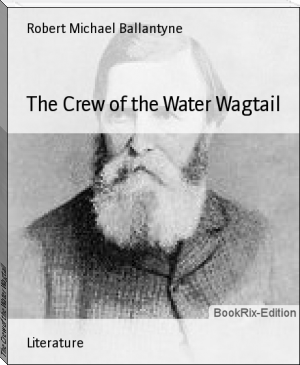The Crew of the Water Wagtail, Robert Michael Ballantyne [e reader pdf best TXT] 📗

- Author: Robert Michael Ballantyne
Book online «The Crew of the Water Wagtail, Robert Michael Ballantyne [e reader pdf best TXT] 📗». Author Robert Michael Ballantyne
"I wonder how long I can stand this without my legs coming off," said poor Oliver, giving way at last to a feeling of despair.
"Seems to me to get hotter and hotter," growled his father, as he wiped the perspiration from his face with the tail of his coat--having lost the solitary handkerchief with which he had landed.
"I'm glad the thaw is so complete," said Hendrick, "for it may perhaps clear away the snow altogether. It is too early for winter to begin in earnest. I would suggest now that we encamp again for a few days, to see whether the weather is really going to change; hunt a little, and rest a while. What say you?"
With a sigh of contentment the captain answered, "Amen!" Paul said, "Agreed!" and Oliver cried, "Hurrah!" at the same time throwing his cap in the air.
Two days after that they were enabled to continue the journey on snowless ground, with the unwieldy shoes slung at their backs.
The change, although decidedly an improvement was not perfect, for the ground had been made soft, the rivers and rills had been swollen, and the conditions altogether were rendered much less agreeable than they had been on the outward journey. The travellers enjoyed themselves greatly, notwithstanding, and the captain added many important jottings in what he styled the log-book of his memory as to bearings of salient points, distances, etcetera, while Paul took notes of the fauna and flora, soils, products, and geological features of the country, on the same convenient tablets.
"There can be no doubt about it," said the latter one morning, as he surveyed the country around him.
"No doubt about what?" asked the captain.
"About the suitableness of this great island for the abode of man," answered Paul; and then, continuing to speak with enthusiasm, "the indication of minerals is undoubted. See you that serpentine deposit mingled with a variety of other rocks, varying in colour from darkest green to yellow, and from the translucent to the almost transparent? Wherever that is seen, there we have good reason to believe that copper ore will be found."
"If so," observed Hendrick, "much copper ore will be found on the sea-coast, on the north side of the island, for I have seen the same rocks in many places there."
"But there are indications of other metals," continued Paul, "which I perceive; though my acquaintance with geological science is unfortunately not sufficient to make me certain, still, I think I can see that, besides copper, nickel, lead, and iron may be dug from the mines of Newfoundland; indeed, I should not wonder if silver and gold were also to be found. Of the existence of coal-beds there can be no doubt, though what their extent may be I cannot guess; but of this I am certain, that the day cannot be far distant when the mineral and forest wealth of this land shall be developed by a large and thriving population."
"It may be as you say, Paul," remarked Captain Trench, with a dubious shake of the head; "but if you had lived as long as I have, and seen as much of the world and its ways, you wouldn't be quite so sanguine about the thriving population or the speedy development. You see, hitches are apt to occur in the affairs of men which cause wonderful delays, and tanglements come about that take years to unravel."
If Captain Trench had been a professional prophet he could hardly have hit the nail more fairly on the head, for he indicated exactly what bad government has actually done for Newfoundland--only he might have said centuries instead of years--for its internal resources, even at the present time, remain to a very great extent undeveloped. However, not being a professional prophet, but merely an ancient mariner, the captain wound up his remark with a recommendation to hoist all sail and lay their course, as there was no saying how long the mild weather would last.
For several days after this they plodded steadily onward, sometimes over the mountains or across the grassy plains, where migrating reindeer supplied them with abundant venison; at other times among lakelets and streams, whose excellent fish and innumerable wildfowl provided them with variety for the table and music for the ear. Now and then they saw the great moose-deer, which rivals the horse in size, and once Hendrick shot one, at a time when they chanced to have consumed their last caribou steak, and happened to enter a great forest without anything for supper in their wallets. For, occasionally, circumstances may render men supperless even when surrounded by plenty.
At last they reached the great lake, with its beautiful islands, where Hendrick had set up his home.
The hunter became very silent as they drew near to its shores.
"You seem anxious," remarked Paul, as they approached the lake. "Have you reason to fear aught?"
"None--none," replied his friend quickly; "but I never return after a long absence without feeling anxious."
A loud halloo soon brought the echoing answer in the shrill voice of little Oscar, whose canoe quickly shot out from the creek. It was speedily followed by the deerskin boat, and, when near enough to be heard, the reply to Hendrick's anxious inquiry was the gratifying assurance--"All's well!"
CHAPTER FIFTEEN.
GRUMMIDGE ASSERTS HIMSELF--GREAT DISCOVERIES ARE MADE AND THE CREW FLITS.
We must turn aside now for a time to inquire into the doings of the crew of the _Water Wagtail_, whom we left on the little island off the eastern seaboard of Newfoundland. At first, when the discovery was made that the captain, Paul, and Oliver had been put ashore and left to take care of themselves without weapons or supplies, there was a disposition on the part of the better men of the crew to apply what we now style Lynch law to Big Swinton, David Garnet, and Fred Taylor. "Let's hang 'em," suggested Grummidge, at a meeting of the men when the culprits were not present. "Sure an' I'll howld the rope wid pleasure," said Squill. "An' I'll help ye," cried Little Stubbs.
But Jim Heron shook his head, and did not quite see his way to that, while George Blazer protested against such violent proceedings altogether. As he was backed up by the majority of the crew, the proposal was negatived.
"But what are we to do, boys?" cried Grummidge vehemently. "Are we goin' to be domineered over by Swinton? Why, every man he takes a dislike to, he'll sneak into his tent when he's asleep, make him fast, heave him into the boat, pull to the big island, land him there, and bid him good-bye. There won't be one of us safe while he prowls about an' gits help from three or four rascals as bad as himself."
"Ay, that's it, boys," said Little Stubbs; "it won't be safe to trust him. Hang him, say I."
Stubbs was a very emphatic little man, but his emphasis only roused the idea of drollery in the minds of those whom he addressed, and rather influenced them towards leniency.
"No, no," cried the first mate of the _Water Wagtail_ who, since the wreck, had seldom ventured to raise his voice in council; "I would advise rather that we should give him a thrashing, and teach him that we refuse to obey or recognise a self-constituted commander."
"Ah, sure now, that's a raisonable plan," said Squill with something of sarcasm in his tone; "an' if I might make so bowld I'd suggist that yoursilf, sor, shud give him the thrashin'."
"Nay, I am far from being the strongest man of the crew. The one that is best able should do the job."
The mate looked pointedly at Grummidge as he spoke; but Grummidge, being a modest man, pretended not to see him.
"Yes, yes, you're right, sir, Grummidge is the very man," cried Stubbs.
"Hear, hear," chorused several of the others. "Come, old boy, you'll do it, won't you? and we'll all promise to back you up."
"Well, look 'ee here, lads," said Grummidge, who seemed to have suddenly made up his mind, "this man has bin quarrellin' wi' me, off an' on, since the beginning of the voyage, whether I would or not, so it may be as well to settle the matter now as at another time. I'll do the job on one consideration."
"What's that?" cried several men.
"That you promises, on your honour (though none o' you's got much o' _that_), that when I've done the job you agree to make me captain of the crew. It's a moral impossibility, d'ee see, for people to git along without a leader, so if I agree to lead you in this, you must agree to follow me in everything--is it so?"
"Agreed, agreed!" chorused his friends, only too glad that one of the physically strongest among them--also one of the best-humoured--should stand up to stem the tide of anarchy which they all clearly saw was rising among them.
"Well, then," resumed Grummidge, "I see Swinton with his three friends a-comin'. I'll expect you to stand by an' see fair play, for he's rather too ready wi' his knife."
While he spoke the comrade in question was seen approaching, with Fred Taylor and David Garnet, carrying a quantity of cod-fish that had just been caught.
"You've been holding a meeting, comrades, I think," said Swinton, looking somewhat suspiciously at the group of men, as he came up and flung down his load.
"Yes, we have," said Grummidge, advancing, hands in pockets, and with a peculiar nautical roll which distinguished him. "You're right, Big Swinton, we _have_ bin havin' a meetin', a sort of trial, so to speak, an' as you are the man what's bin tried, it may interest you to know what sentence has bin passed upon you."
"Oh indeed!" returned Swinton, with a look of cool insolence which he knew well how to assume, no matter what he felt. "Well, yes, it _would_ interest me greatly to hear the sentence of the learned judge--whoever he is."
The fingers of the man fumbled as he spoke at his waist-belt, near the handle of his knife. Observing this, Grummidge kept a watchful eye on him, but did not abate his _nonchalant_ free-and-easy air, as he stepped close up to him.
"The sentence is," he said firmly but quietly, "that you no longer presume to give orders as if you was the captain o' this here crew; that from this hour you fall to the rear and undertake second fiddle--or fourth fiddle, for the matter o' that; and that you head a party to guide them in a sarch which is just a-goin' to begin for the two men and the boy you have so sneakingly betrayed and put on shore--an' all this you'll have to do with a ready goodwill, on pain o' havin' your brains knocked out if you don't. Moreover, you may be thankful that the sentence is so light, for some o' your comrades would have had you hanged right off, if others hadn't seen fit to be marciful."
While this sentence was being pronounced, Swinton's expression underwent various changes, and his face became visibly paler under the steady gaze of Grummidge. At the last word he grasped his knife





Comments (0)